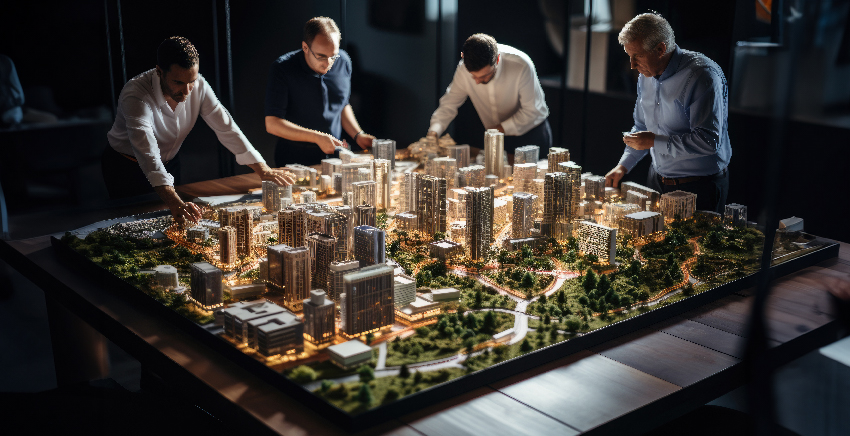Have you ever wondered who ensures that your residential community runs smoothly, from security to maintenance? Facility management is essential for maintaining a smoothly operating environment in both townships and societies. But how do these two residential types differ when it comes to managing amenities and services?
In this blog, we’ll explore the difference between townships and societies, specifically focusing on how facility management works within each setup. Whether you are choosing your next home or are simply curious about the behind-the-scenes operations, this guide will help you understand the scope, costs, and pros and cons of facility management in these two residential models.
Understanding Townships and Societies
What is Township Living?
A township is a large-scale residential development designed to be self-sufficient. It’s a mini-city that integrates various amenities such as schools, hospitals, parks, shopping centres, and even workplaces. Townships are planned to cater to the needs of thousands of residents and offer a comprehensive living experience.
What is Society Living?
In contrast, a society is a smaller residential community, typically comprising a few buildings or blocks. Societies provide basic amenities such as a clubhouse, gym, and security, but the scale and variety of facilities are far more limited compared to townships.
Scope of Facility Management
Township Facility Management/ Services
Facility management in a township involves a complex network of services and infrastructure. Due to the vast scale, multiple teams are required to handle specialized services, including security, maintenance, waste management, landscaping, and even transportation services.
Townships often incorporate advanced technologies such as IoT (Internet of Things) for efficient management. These technologies may include smart home systems, centralized control centres, and mobile apps for residents to report issues, book amenities, and make payments seamlessly.
Society Facility Management/ Services
Facility management in a society is far more limited in scope. With fewer amenities, societies usually have a smaller management team, often outsourced to third-party service providers. The focus is primarily on basic maintenance and security, such as cleaning common areas, managing access points, and ensuring that utilities are functional.
Key Differences Between Township And Society Facility Management
| Aspect | Township | Society |
|---|---|---|
| Scale of Operations | Large-scale, organized management with multiple specialized teams | Small-scale, focused on basic needs with fewer services |
| Cost Implications | Higher costs but more efficient due to economies of scale | Lower costs, but limited services |
| Technology Integration | Advanced tech like IoT, smart systems, and apps for management | Traditional methods with minimal tech use |
| Management Structure | Professional teams handling various services | Often managed by residents or outsourced to small teams |
| Security | High-level security with surveillance systems | Basic security with manual systems |
| Resident Interaction | Less personal, with communication through apps | More personalized, community-driven management |
Pros and Cons Between Township and Society Management
Township Facility Management
Pros:
- Comprehensive services covering all aspects of living, from maintenance to security.
- Professional management teams ensure high-quality services.
- The use of advanced technology leads to efficient and proactive management.
- Better security with surveillance systems and gated communities.
Cons:
- Higher maintenance fees due to the scale and services provided.
- Potential for bureaucracy, as large-scale management can sometimes lead to delays or impersonal service.
- Less personalized management compared to smaller communities.
Society Facility Management
Pros:
- Lower costs as the range of services is limited, and the community is smaller.
- Community involvement often leads to more personalized management, where residents can have a say in decisions.
- More informal, with less hierarchy, compared to large townships.
Cons:
- Limited amenities compared to townships.
- More resources are needed for maintenance, upgrades, or new technologies.
- Less advanced technology, often relying on traditional management methods.
What is Better? Township Vs. Society Living
Lifestyle Factors
Your lifestyle is a key factor in deciding between living in a township or a society. Townships are ideal for families and individuals who prioritize convenience, security, and access to a wide range of amenities. They’re often designed to cater to all age groups, from children to older people.
On the other hand, societies might suit residents looking for a closer-knit, community-driven atmosphere. Societies offer simplicity and personalization that may appeal to singles, elderly individuals, or those who prefer less complexity in their living arrangements.
Budget Considerations
When weighing the cost of facility management, it’s essential to balance the benefits against the budget. Townships often come with higher maintenance fees due to their scale and services, but the economies of scale can make it worthwhile. In contrast, societies have lower costs but offer fewer services, making them more suitable for those with tighter budgets or simpler living needs.
Conclusion
To sum up, townships and societies differ greatly in terms of facility management, scale, cost, and the level of amenities provided. Ultimately, the choice between living in a township or a society depends on your personal preferences, lifestyle, and budget. Whether you’re drawn to the all-encompassing convenience of a township or the simplicity of a society, understanding the differences in facility management can help you make an informed decision.
If you are seeking a premium township living experience, Amanora Park Town, one of the biggest residential projects in Pune and also India’s 1st fully integrated township stands as an ultimate choice offering a world-class lifestyle.





